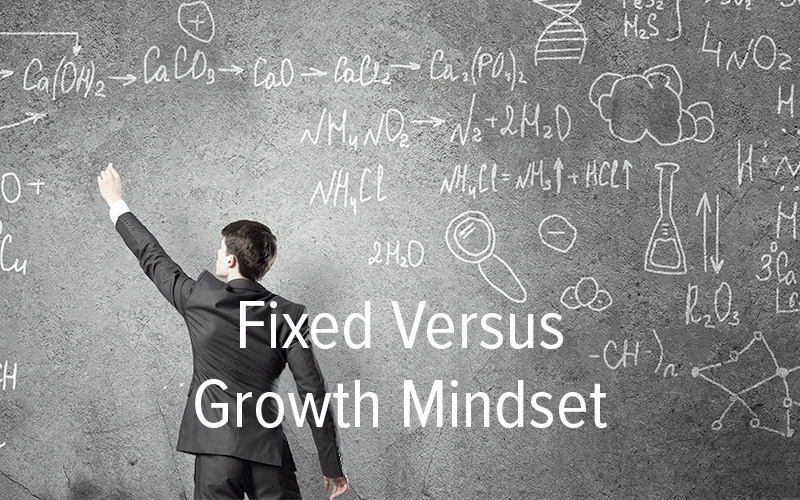
Mindsets
Learners fall into two camps in their beliefs about intelligence and ability. One group thinks intelligence is fixed for life. People are born smart or born dumb depending on lucky or unlucky genes. The other group believes that intelligence is gained bit by bit through effort and strategy.
These are mindsets. The fixed mindset believes that intelligence is set for life. The growth mindset thinks intelligence can be earned.
The two mindsets lead to different goals and different outcomes. The growth mindset produces people who strive for success, especially in the face of failure. Mistakes are seen as signals from the universe that more work is needed. The growth mindset realizes that failure does not contain a value judgment. For these people, knowledge is the goal to be fought for and won.
The fixed mindset produces the opposite: people who feel caged by the dose of IQ they received. They are performance oriented and fear looking bad. They pass up learning opportunities that might reveal their lack of knowledge. They are far more likely to cheat than people who hold the growth mindset because their goal is not achievement but looking smart.
The Source of a Fixed Mindset
Early in a child’s development, negative messages from parents, teachers, and peers can produce the fixed mindset. Perversely, praise for intelligence also encourages this mindset and is therefore quite handicapping. Although it’s normal and intuitive to encourage children, when a child is told they are smart, the trap of a fixed mindset is being set. Instead, teachers and parents should always reward effort and strategy rather than highlighting the intelligence of the child.
When kids from grade school through college are tested on how mindset affects learning, they show equal intellectual capacity until the tasks become more challenging. Then the fixed mindset reveals itself, and kids performing well to that point begin to give up, take too much time, make excuses, or choose the easiest tasks to work on. This makes sense if you think that capacity is fixed and you don’t want to reveal a deficit. The irony is that the fixed mindset produces a focus on performance and status that ultimately makes its adherents less likely to achieve either. The fixed mindset rarely allows the opportunity to learn from failure because faking it is better than failing.
Changing a fixed mindset
People tend to hang onto their mindsets for life. Mindset is stubborn psychology, deep in the mental schema and worldview of its adherents. There are, however, encouraging experiments showing that the fixed mindset can be transformed into the growth mindset.
First, education about the brain’s plasticity—its ability to grow and change and form new synaptic connections with learning—can convince people that intellectual horsepower comes through the effort of learning and practice.
Second, showing examples of a growth mindset in cultural heroes like Edison, Lincoln, and Einstein can persuade students that it takes hard work over time to get smart and do well. Einstein was a patent clerk who worked on his equations every night for years. Lincoln did his homework with charcoal when pencils were scarce. And Edison famously said that he never failed at any of his experiments leading to the electric light; rather, he discovered 995 ways how not to make a light bulb.
“Most interesting, our research has demonstrated that those who avoid challenge and show impairment in the face of difficulty are initially equal in ability of those who seek challenge and show persistence.” —Carol Dweck, A Social Cognitive Approach to Motivation and Personality







